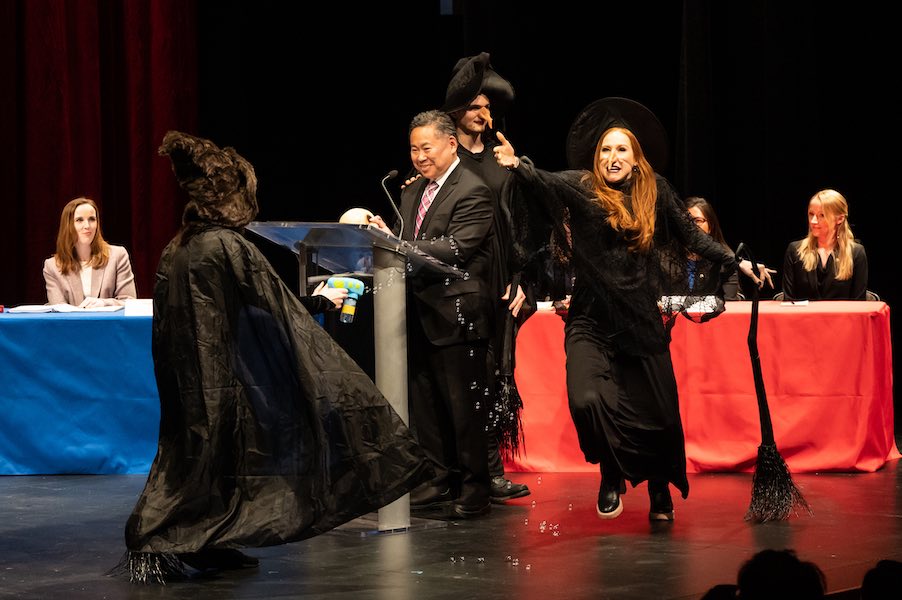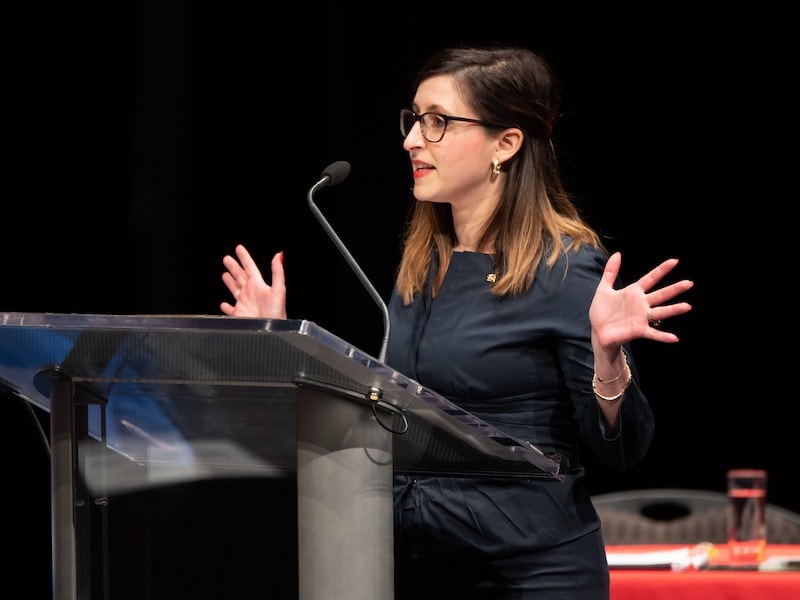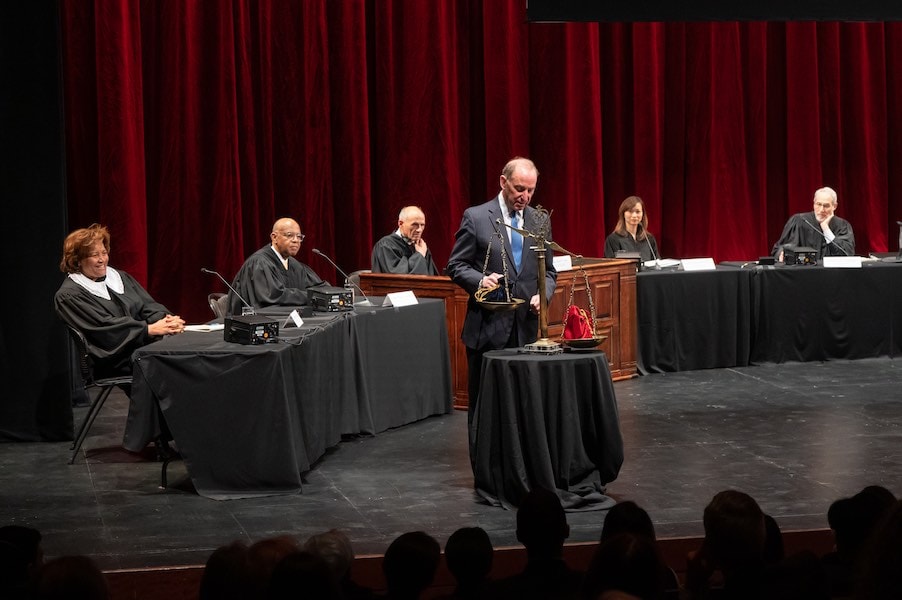Shakespeare Theatre Company’s 36th Mock Trial, Leary of Treason: Goneril v. The Kingdom, was fast, fiery, and funnier than ever. The evening was replete with discussions of witch hunts, shirtless horseback rides, and the inalienable right of sovereigns to shoot people on Fifth Avenue.
The arguments covered a startling array of topics, from the 25th Amendment to Clarence Thomas to the role God plays in U.S. jurisprudence. Less-legal subjects included Prince Harry’s Spare, Chinese labs, Italian space lasers, and the imperfections of the French army. The snappy comebacks were frequent and scorching, from “What about Anne Boleyn?” to “We only call balls and strikes” to “I don’t like that question so I will move on.” The audience frequently exploded in laughter.
There was a constellation of legal luminaries, along with guest celebrities from the Shakespearean canon. Periodically, whenever the word “witch” was mentioned, the Three Witches (Ashley Klinger, Grant Jennings, and Patricia Ulbert) from the Scottish play danced in, muttering “double, double, toil and trouble”. One (Leader Ashley Klinger) was on sequined roller skates. It’s always nice to be reminded that there are other plays besides King Lear, even if it is dangerous at times to mention the actual name.

We learned that King Lear’s daughter Goneril has run into a spot of bother. Despite having ingratiated herself enough with her father to inherit half of his kingdom, she has met with some resistance. Her younger sister Cordelia has raised an army against her, intending to reinstate their father. A war has ensued between the two factions. King Lear is now back in power, and Goneril has been convicted by the King’s Bench of misprision of treason, insurrection, seditious conspiracy, and advocating the overthrow of the government.
Goneril now appeals to the Supreme Court of the United Kingdom.
Although some no doubt well-meaning Representatives may believe divine intervention is necessary (See U.S. Representative Lauren Boebert [R-CO 3rd District]: “I’m tired of this separation between church and state junk”), King Lear has decreed that the laws in effect as of 2023 in any union of England’s future North American colonies will apply to all matters concerning him.
Our Moderator was Abbe David Lowell, STC Board of Trustees Vice Chair, and Chair of the Bard Association.
After his always gracious welcome, Lowell introduced The Supreme Court of the United Kingdom: Judge David S. Tatel, United States Court of Appeals for the District of Columbia Circuit, presiding; Judge J. Michelle Childs, United States Court of Appeals for the District of Columbia Circuit; Judge Paul L. Friedman, United States District Court for the District of Columbia; Chief Judge Roger L. Gregory, United States Court of Appeals for the Fourth Circuit; Judge Florence Y. Pan, United States Court of Appeals for the District of Columbia Circuit; and Marshal for the Court, Marshal Pamela Talkin, Former Marshal of the Supreme Court of the United States.

Counsel for Goneril, the Petitioner was Michelle Kallen, Partner, Jenner & Block; former Solicitor General of Virginia. Counsel for The Kingdom, the Respondent, was Shanlon Wu, Partner, Cohen Seglias; Former Assistant United States Attorney & Counsel to Attorney General Janet Reno.
Special Guest was Rosa Gilmore, who plays Goneril in STC’s current production King Lear. Another extremely illustrious Special Guest made a surprise appearance.
On Goneril’s appeal, the questions presented were:
- Whether Lear’s territorial grant had the legal effect of ending his reign, thus rendering Goneril and Regan (together with their respective husbands) sovereign over their assigned territories, so that their actions against Lear were not crimes, but steps taken to defend their proper governmental authority.
- Alternatively, if Lear’s rule continued despite his territorial grant, whether Goneril’s free speech rights under the First Amendment shield her from prosecution for her statements and activity in resisting his authority.
Counsel of record for Petitioner Goneril, Michelle Kallen, defended Goneril’s actions.
Lear wanted to retain all the glory, Kallen said: Mar-A-London, emoluments, shirtless horseback rides, and hundreds of fans clapping along with his speeches, but the true authority rested with Goneril. In taking up arms against Cordelia, she was simply defending her Kingdom from a foreign invasion. Goneril was indisputably sovereign. Not only that, she was and is Her Majesty, the Rightful Queen of the Kingdom.
The mentions of “shirtless horseback rides” and “clapping fans” were particularly well-received.
Even if the court does not recognize Goneril’s sovereignty, Kallen argued, we must remember that at that time women were essentially property. And according to the Bard himself, “a woman may be made a fool” (The Taming of the Shrew) or even a lunatic (Richard III) at the least provocation.
In a nutshell, Queen Goneril did not commit crimes against the Kingdom because either she is the Kingdom’s rightful sovereign or she does not legally exist.
Although the last argument was indeed hilarious, the women in the audience may have been somewhat taken aback, having believed for all their lives that they were indeed sentient beings.
According to counsel, Goneril’s letter to her lover Edmund, in which she encouraged him to raise forces for her and offered to make him King, was never meant as an incitement to violence. In reality, it was a “perfect letter,” a personal expression, inspired by love.
Goneril ultimately dissolved the court, explaining that it was illegitimate and “crooked.” In addition, following the example of a very stable genius, she pardoned herself for all present and future liability.
For the Respondent, The Kingdom, counsel of record Shanlon Wu argued that Lear’s kingship was a divine, even mystical right coming directly from God. In fact, Lear can declassify documents “just by thinking about it.”
Goneril’s letter to Edmund was indeed a true threat. In fact, according to counsel for The Kingdom, it is just possible that Goneril is in fact a witch, which would explain the constant interruptions by dubious characters from the Scottish play.
King Lear did not transfer his mystical sovereign power to Goneril, Wu argued. Goneril’s words in her letter to Edmund were a true threat of physical violence not protected by the First Amendment. The Respondent asserts that the King’s Bench’s decision to convict Goneril of her crimes should be affirmed.

What about the verdict? The Judges voted 60% to 40% for the Kingdom. The audience, from their smartphones, voted the opposite, 60% to 40% for Goneril. Moderator Abbe Lowell quipped, “That’s why they wear the black robes and we don’t.”
Simon Godwin, the artistic director of STC and director of King Lear, was a surprise Special Guest. He bounded happily onstage to thank everyone and announce that King Lear had given STC the best one-day box office in 35 years.
Special Guest Rosa Gilmore, who plays Goneril, answered audience questions with congeniality and charm. She discussed finding something to love or defend in the character, Goneril’s belief that what she is doing is right for the Kingdom, and, most important, that she is obviously not guilty.
It was clear that the audience agreed with her.

The Shakespeare Theater Company’s 36th Mock Trial was convened on March 13, 2023, in STC’s Sidney Harman Hall, 610 F St NW, Washington, DC.
Running Time: 1 hour and 20 minutes.
The digital program for the evening, which includes the Mock Trial Scenario, is online here. The Brief for the Petitioner (Goneril) is downloadable here. The Brief for the Respondent (The Kingdom) is downloadable here. The Scenario and Briefs were a collaborative effort by the Bard Association, the Bench, and Counsel themselves.)
SEE ALSO:
Right now at Shakespeare Theatre, Patrick Page is a Lear for the ages (column by Sophia Howes, March 13, 2023)
Shakespeare Theatre delivers a breathtaking ‘King Lear’ (review by Bob Ashby, March 3, 2023)





This is hilariously funny–and written in the right spirit for both the trial and the time, being less yesterday than today. I love it.